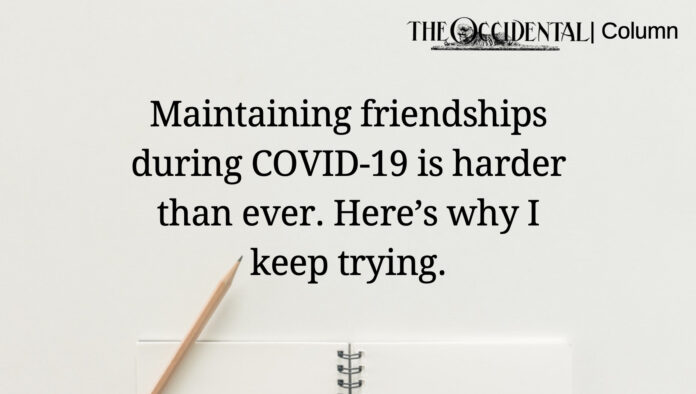When it comes to friendships, I’ve always preferred quality over quantity: the kind of friends with whom you can talk about anything and who support you unconditionally. But over the past year, due to both external and internal circumstances, making and maintaining friendships has become harder for me.
Even as a person with anxiety, I found it easy to make friends during my first two years at Oxy. I reached out to classmates to study with me or get lunch at the Marketplace. By sophomore year I had a group that I spent most of my time with. They were a strong support system and helped me feel confident and happy while at school. I was ready to take a big risk: studying abroad in Argentina.
The social aspects of Argentina were difficult. I missed my friends and family and I felt excluded by the students in my program. This experience made me even more excited to return to campus to finish my junior and senior years. However, the classes were harder and most of my friends were abroad. My friends on campus had made newer, closer friends. It hurt to see that we had grown apart. Eventually, I was able to reach out and form new friendships. Then COVID-19 hit.
When Oxy made the official announcement that the spring semester would be remote, I was at the Exploratorium in San Francisco with some of my senior friends. We had been riding public transportation, eating at restaurants and enjoying each other’s company. As I received Oxy’s email, I looked around sadly at my friends who were in their last semester of college. I remember as I said goodbye, I had a sinking feeling in my chest, like a child who had let go of a shiny red balloon too soon. I watched them float away and I felt powerless in these new circumstances.
During quarantine I lost touch with many of my Oxy friends. Although I tried to reach out via text, it was hard to make an effort to keep up with people whom I’d normally see every day. In March and April, I’d often wake up with no motivation. Online school felt strange and unengaging. I had trouble doing work I once found easy. Without anything to distract me, I became overwhelmed by the news, whether it was politics, the pandemic or racial injustices. My mental health suffered as I carried the burdens of the virus alone.
To treat my growing feelings of depression and loneliness, I went back to therapy. Together, my therapist and I realized that one of the causes of my COVID-induced lack of motivation was the absence of interaction with friends. When I was at Oxy, my friends inspired me to get outside my comfort zone. We’d explore Malibu and the 626 Night Market together — places I’d never face on my own. In our conversations, they’d challenge and develop my beliefs and provide me the motivation to be a confident, resilient person. One of the strategies my therapist and I devised to improve my mental health was reconnecting with friends. Here are three things I do to help me maintain a social life during COVID-19.
First, I seek out safe in-person experiences instead of just online interactions. Since COVID-19 regulations require people to meet outdoors, my friends and I walk on the beach, picnic outdoors or hike. Hanging out in person with friends outdoors gives me the double benefit of getting both exercise and social interaction, which are both scientifically proven ways to improve mental health.
Second, I evaluate my relationships and maintain those that are reciprocated. I’ve had the discouraging experiences of texting someone and receiving no response and calling someone only to hear them talk only about themselves. It frustrated me that these friends didn’t put any effort into staying in touch or care about my feelings or needs. Now, I am more motivated to reach out to people who support my growth and well-being.
Third, I reach out to extended family members, which supports their mental health as well as my own. I’ve been calling my grandmother more often and I even helped her build her own website to sell her felted scarves. I’ve also been able to help my grandmother navigate Zoom. Older people like grandparents, who are especially vulnerable to COVID-19, tend to be more isolated than younger people, so reaching out to them is especially important right now. I know she appreciates the tech support and I appreciate her calming and grounding presence in my life.
It’s okay if you don’t feel you are able to make friends right now. The world is such a frustrating place and things we took for granted — like another year of college on campus — are no longer possible. However, when you are ready, I hope you find strategies that work well for you. I hope this article gives you the courage to reach out and plan something with friends you haven’t talked to in a while or people with whom you share a class or interest. If you’re really struggling, you can always contact me: I’m open to making new friends.
![]()




































